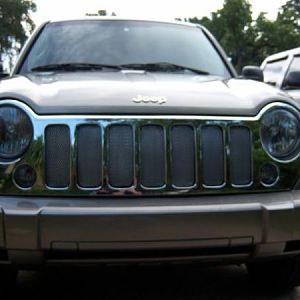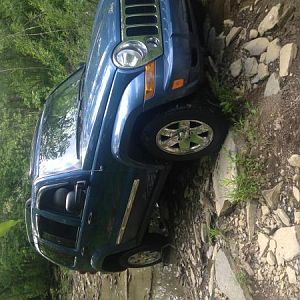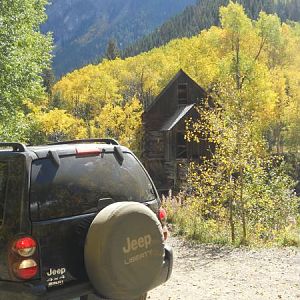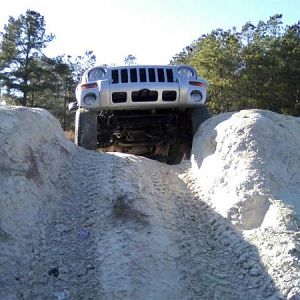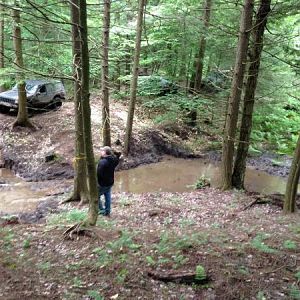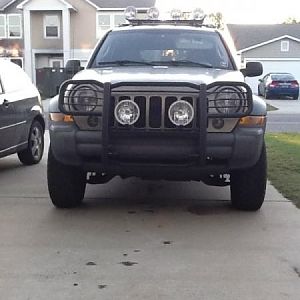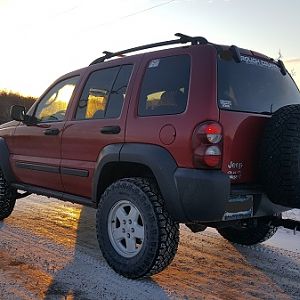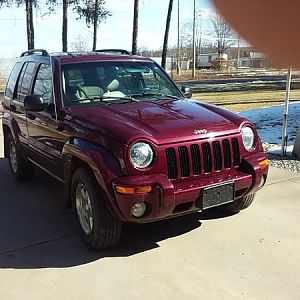photograjeep
Full Access Member
Here is an exhaustive list of things to do and tools to bring prior to and during an offroad expidition. Prior to telling me that it is too much stuff, please read over it anyways, because it isn't a rule, it is a guide. It jogs your memory and you can decide what to bring. If you can think of other stuff, I will update this post. Wonder if this will be a sticky...
Basic Tips
Always travel in groups of 2 or more vehicles
Always alert someone back home where you are going and when you expect to return
Take at least a basic supply of tools and gear (see The Basic, Minimal Offroad Checklist)
Pre-departure Maintenance Checklist
Check engine oil
Check transmission oil
Check brake fluid
Check radiator coolant
Check windshield wiper fluid
Check fan belts
Check hoses
Check air cleaner
Check seat belts
Check tire air pressure (air up to recommended pressure for highway driving, air down at trail head, air up prior to trip home)
Check for tire wear or damage
Tighten drive shaft u-bolts
Check and tighten lug bolts
Check for frame cracks
Check brake pads & shoes (adequate braking pad material, in good condition and without contamination)
Check for loose bolts or nuts throughout vehicle
Grease all fittings (u-joints, steering)
Check gear oils: transfer case/differentials, replace if necessary
Check Winch for proper operation, check winch cable for kinks, frays or damage, straighten winch cable if necessary
Check shocks
The Basic, Minimal Offroad Checklist
The minimal list is the basics that you should always carry in your vehicle when offroad. These items are good to have in the vehicle at all times.
First Aid Kit (See Safety and Survival below)
Basic Personal Essentials (water, food)
Spare Tire, Full Size
Jack and tire iron to change your tire
Tow strap
Tree saver
Come-alongs
Basic Tool Kit
Spare Key for vehicle
Safety and Survival
The First Aid Kit
First aid kits come in many shapes and sizes. You can buy them, or you can make your own kit. Whether you buy a first aid kit or put one together, make sure it has all the items you may need. Include any personal items, such as medications.
Here are suggestions for the contents of a first aid kit:
Activated Charcoal (use only if instructed by Poison Control Center)
Adhesive Tape
Antiseptic Ointment
Alcohol swabs, individually wrapped
Band-Aids (assorted sizes)
Blanket
Cold Pack
Disposable Gloves
Gauze Pads and Roller Gauze (assorted sizes)
Hand Cleaner
Plastic Bags
Scissors and Tweezers
Small Flashlight and Extra Batteries
Syrup of Ipecac (use only if instructed by Poison Control Center)
Triangular Bandage
Burnaid gel
Snake Bite kit
Disposable emergency blanket
Instant Cold pack
Instant Hot pack
Medications:
Anti-diarrhea medication, Tylenol ( fever reducer), Ibuprofen (Nuprin, Motrin, Advil) inflammation reduction, sprains bruises, etc, Benadryl for mild allergic reactions, Epinephrine in the form of an Epi Pen to treat more serious allergic reactions that might otherwise be fatal.
Safety Items
Safety Glasses
Leather Gloves
Fire Extinguisher - Should be mounted in the vehicle in an easily accessible location.
Flares
Tarp
flashlights
matches / lighter
Basic Personal Essentials
Water - At least one Gallon per person, per day if not more. Drier, hotter climates may require more. Remember: Alcohol doesn't hydrate. In fact alcoholic beverages dehydrate since it take more water to metabolize alcohol than the beverage contains. Plus it may cause you to require the above mentioned First Aid Kit.
Food - Bring food for twice the amount of time you are planning on being gone. Should you be delayed and have to spend a night out on the trail, you wont have to worry about going hungry. Good ideas for trail food: trail mix, beef jerky, fruits, dry/canned food, etc.
Extra Cloths - Nobody likes to sit in wet cloths or an extended period of time.
Personal items - This includes toilet paper, anti- microbial hand cleaner, etc
Sun block
Rain Jacket
Communication devices - Cell Phone, CB Radio, GMRS/FRS radios
Power inverter if necessary (e.g. Cell phone recharger, battery recharger for communication devices and camera)
Trash bags - Keep your trails clean
Maps, information about the area
Compass or GPS
Water purification tablets
Survival - Seasonal Specific
Winter
Extra clothing
Warm outer layers (jacket, wind breaker)
Head gear (warm hat, hooded jacket)
Emergency blanket (compact survival type)
Summer
Sun Block
Insect repellant
Sunglasses
Beyond the Basic Offroad Checklist
What goes beyond the basic checklist are items that depend on many factors. Factors like what form of offroading you will be doing, your driving style, the terrain you will encounter, how much room you have for packing gear, how remote you will be traveling, how long you will be gone as well as many other factors you should consider. However three primary things you should gear up for are Safety and Survival, Vehicle Recovery and Vehicle Breakage.
Vehicle Recovery
Recovery Items
Hilift Jack
Tow straps - 2 or more, 2 inch width or wider, 20 foot or longer
Tree saver
Come-along (one or more)
D-rings, Shackles
Shovel
Chainsaw and bar oil, 2 cycle engine oil, spare chain (can be handy in recover situations, as well as for trail clearing on wooded trails)
Winch Kit: tree strap, hi-lift jack, snatch block, pickle fork, shackle, gloves
Pullpal
Snow tire chains (if tires don't cut it)
Tools
Basic Tools
Basic tools are the versatile, essential tool sets that consist of a variety of sizes and combinations of commonly used tools such as socket sets, wrench sets, Allen wrenches, Torx sets and screw drivers. Your tool sets should cover the variety of sizes found in your vehicle. Regardless of whether your vehicle is American made or an import 4x4, when it comes to socket sets and wrenches, it's sometimes wise to carry standard and metric socket since sometimes there are a mix of both standard and metric on custom vehicles not to mention helping a fellow 4wheeler.
Complete Socket Set with SAE (standard) and Metric with 3/8" and 1/2" drives. Deep and standard sockets.
Crescent, open end combination box wrenches SAE (standard) and Metric
Allen Wrenches
Torx sockets (especially if you own a Jeep)
Standard & Phillips screwdrivers, large, medium, small
Versatile Tools
Versatile tools are those that have many uses.
Large Hammer (a.k.a. the "BFH")
Pliers (various sizes)
Needle Nose Pliers
Vice Grips, various sizes
Large channel-lock Pliers
Pipe wrenches - having 2 medium of these can be useful for tie-rods.
Utility knife or razor blades
Crescent wrenches (medium & large)
A BIG pry bar or length of strong metal pipe, inside diameter of pipe large enough to slip over a wrench or socket drive for extra leverage.
Magnet
Specialty Tools
Snap ring pliers
Air Pressure Gauge
Portable air pump
Jumper cables
Additional Items
Versatile Items
Duct Tape
Bailing wire
wood blocks - Useful as chock blocks, jacking platforms, ramps, suspension supports (for broken torsion bars)
Bungee cords, several in multiple sizes - good for securing gear, temporary repairs, etc.
Rope lengths
Super glue
Epoxy
Tie wraps
rags
Work Gloves, leather
For the Vehicle
Fluids
Engine Oil
Brake Fluid
Power steering fluid
Automatic transmission fluid
Coolant or Water
Bearing Grease
WD-40
Starter Fluid
Extra gas
Funnel, siphon hose
Spare Parts / Repair Items
Lug Wrench
Extra Fan / serpentine belts
Hoses, fuel line, coolant hoses
Spare Tire
Tire repair kits, plugs
Extra Lug nuts, tire star wrench or lug key with key socket
Cotter pins / keys - various sizes
Valve stems, Valve stem remover
Nuts & bolts assorted standard and metric sizes
RTV or Hylomar HPF - form-a-gasket
Radiator stop leak - silver flakes in tube
Spare Hub (and hub fuses if applicable).
Electric fuel pump
Coil / electronic ignition
Spare Universal Joints (U-joints for drive shaft & axles)
Spare Drive Shaft (rear and front)
Extra spark plug wire (size of longest wire)
Spare points
Electronics Repair Kit
Volt ohms meter (multimeter)
Wire cutters / wire crips / wire strippers (multi-tool)
Spare fuses of all sizes and types used in your vehicle
Electrical tape
Spare wire - lengths of various gauges
Spare switches
Spare relay if you use relays
crip on ends (male and female, various gauges)
Small pocket sized needle point blow torch (handy for soldering wire)
Flux core solder for repairs
Wiring Diagram of your vehicle
Basic Tips
Always travel in groups of 2 or more vehicles
Always alert someone back home where you are going and when you expect to return
Take at least a basic supply of tools and gear (see The Basic, Minimal Offroad Checklist)
Pre-departure Maintenance Checklist
Check engine oil
Check transmission oil
Check brake fluid
Check radiator coolant
Check windshield wiper fluid
Check fan belts
Check hoses
Check air cleaner
Check seat belts
Check tire air pressure (air up to recommended pressure for highway driving, air down at trail head, air up prior to trip home)
Check for tire wear or damage
Tighten drive shaft u-bolts
Check and tighten lug bolts
Check for frame cracks
Check brake pads & shoes (adequate braking pad material, in good condition and without contamination)
Check for loose bolts or nuts throughout vehicle
Grease all fittings (u-joints, steering)
Check gear oils: transfer case/differentials, replace if necessary
Check Winch for proper operation, check winch cable for kinks, frays or damage, straighten winch cable if necessary
Check shocks
The Basic, Minimal Offroad Checklist
The minimal list is the basics that you should always carry in your vehicle when offroad. These items are good to have in the vehicle at all times.
First Aid Kit (See Safety and Survival below)
Basic Personal Essentials (water, food)
Spare Tire, Full Size
Jack and tire iron to change your tire
Tow strap
Tree saver
Come-alongs
Basic Tool Kit
Spare Key for vehicle
Safety and Survival
The First Aid Kit
First aid kits come in many shapes and sizes. You can buy them, or you can make your own kit. Whether you buy a first aid kit or put one together, make sure it has all the items you may need. Include any personal items, such as medications.
Here are suggestions for the contents of a first aid kit:
Activated Charcoal (use only if instructed by Poison Control Center)
Adhesive Tape
Antiseptic Ointment
Alcohol swabs, individually wrapped
Band-Aids (assorted sizes)
Blanket
Cold Pack
Disposable Gloves
Gauze Pads and Roller Gauze (assorted sizes)
Hand Cleaner
Plastic Bags
Scissors and Tweezers
Small Flashlight and Extra Batteries
Syrup of Ipecac (use only if instructed by Poison Control Center)
Triangular Bandage
Burnaid gel
Snake Bite kit
Disposable emergency blanket
Instant Cold pack
Instant Hot pack
Medications:
Anti-diarrhea medication, Tylenol ( fever reducer), Ibuprofen (Nuprin, Motrin, Advil) inflammation reduction, sprains bruises, etc, Benadryl for mild allergic reactions, Epinephrine in the form of an Epi Pen to treat more serious allergic reactions that might otherwise be fatal.
Safety Items
Safety Glasses
Leather Gloves
Fire Extinguisher - Should be mounted in the vehicle in an easily accessible location.
Flares
Tarp
flashlights
matches / lighter
Basic Personal Essentials
Water - At least one Gallon per person, per day if not more. Drier, hotter climates may require more. Remember: Alcohol doesn't hydrate. In fact alcoholic beverages dehydrate since it take more water to metabolize alcohol than the beverage contains. Plus it may cause you to require the above mentioned First Aid Kit.
Food - Bring food for twice the amount of time you are planning on being gone. Should you be delayed and have to spend a night out on the trail, you wont have to worry about going hungry. Good ideas for trail food: trail mix, beef jerky, fruits, dry/canned food, etc.
Extra Cloths - Nobody likes to sit in wet cloths or an extended period of time.
Personal items - This includes toilet paper, anti- microbial hand cleaner, etc
Sun block
Rain Jacket
Communication devices - Cell Phone, CB Radio, GMRS/FRS radios
Power inverter if necessary (e.g. Cell phone recharger, battery recharger for communication devices and camera)
Trash bags - Keep your trails clean
Maps, information about the area
Compass or GPS
Water purification tablets
Survival - Seasonal Specific
Winter
Extra clothing
Warm outer layers (jacket, wind breaker)
Head gear (warm hat, hooded jacket)
Emergency blanket (compact survival type)
Summer
Sun Block
Insect repellant
Sunglasses
Beyond the Basic Offroad Checklist
What goes beyond the basic checklist are items that depend on many factors. Factors like what form of offroading you will be doing, your driving style, the terrain you will encounter, how much room you have for packing gear, how remote you will be traveling, how long you will be gone as well as many other factors you should consider. However three primary things you should gear up for are Safety and Survival, Vehicle Recovery and Vehicle Breakage.
Vehicle Recovery
Recovery Items
Hilift Jack
Tow straps - 2 or more, 2 inch width or wider, 20 foot or longer
Tree saver
Come-along (one or more)
D-rings, Shackles
Shovel
Chainsaw and bar oil, 2 cycle engine oil, spare chain (can be handy in recover situations, as well as for trail clearing on wooded trails)
Winch Kit: tree strap, hi-lift jack, snatch block, pickle fork, shackle, gloves
Pullpal
Snow tire chains (if tires don't cut it)
Tools
Basic Tools
Basic tools are the versatile, essential tool sets that consist of a variety of sizes and combinations of commonly used tools such as socket sets, wrench sets, Allen wrenches, Torx sets and screw drivers. Your tool sets should cover the variety of sizes found in your vehicle. Regardless of whether your vehicle is American made or an import 4x4, when it comes to socket sets and wrenches, it's sometimes wise to carry standard and metric socket since sometimes there are a mix of both standard and metric on custom vehicles not to mention helping a fellow 4wheeler.
Complete Socket Set with SAE (standard) and Metric with 3/8" and 1/2" drives. Deep and standard sockets.
Crescent, open end combination box wrenches SAE (standard) and Metric
Allen Wrenches
Torx sockets (especially if you own a Jeep)
Standard & Phillips screwdrivers, large, medium, small
Versatile Tools
Versatile tools are those that have many uses.
Large Hammer (a.k.a. the "BFH")
Pliers (various sizes)
Needle Nose Pliers
Vice Grips, various sizes
Large channel-lock Pliers
Pipe wrenches - having 2 medium of these can be useful for tie-rods.
Utility knife or razor blades
Crescent wrenches (medium & large)
A BIG pry bar or length of strong metal pipe, inside diameter of pipe large enough to slip over a wrench or socket drive for extra leverage.
Magnet
Specialty Tools
Snap ring pliers
Air Pressure Gauge
Portable air pump
Jumper cables
Additional Items
Versatile Items
Duct Tape
Bailing wire
wood blocks - Useful as chock blocks, jacking platforms, ramps, suspension supports (for broken torsion bars)
Bungee cords, several in multiple sizes - good for securing gear, temporary repairs, etc.
Rope lengths
Super glue
Epoxy
Tie wraps
rags
Work Gloves, leather
For the Vehicle
Fluids
Engine Oil
Brake Fluid
Power steering fluid
Automatic transmission fluid
Coolant or Water
Bearing Grease
WD-40
Starter Fluid
Extra gas
Funnel, siphon hose
Spare Parts / Repair Items
Lug Wrench
Extra Fan / serpentine belts
Hoses, fuel line, coolant hoses
Spare Tire
Tire repair kits, plugs
Extra Lug nuts, tire star wrench or lug key with key socket
Cotter pins / keys - various sizes
Valve stems, Valve stem remover
Nuts & bolts assorted standard and metric sizes
RTV or Hylomar HPF - form-a-gasket
Radiator stop leak - silver flakes in tube
Spare Hub (and hub fuses if applicable).
Electric fuel pump
Coil / electronic ignition
Spare Universal Joints (U-joints for drive shaft & axles)
Spare Drive Shaft (rear and front)
Extra spark plug wire (size of longest wire)
Spare points
Electronics Repair Kit
Volt ohms meter (multimeter)
Wire cutters / wire crips / wire strippers (multi-tool)
Spare fuses of all sizes and types used in your vehicle
Electrical tape
Spare wire - lengths of various gauges
Spare switches
Spare relay if you use relays
crip on ends (male and female, various gauges)
Small pocket sized needle point blow torch (handy for soldering wire)
Flux core solder for repairs
Wiring Diagram of your vehicle


